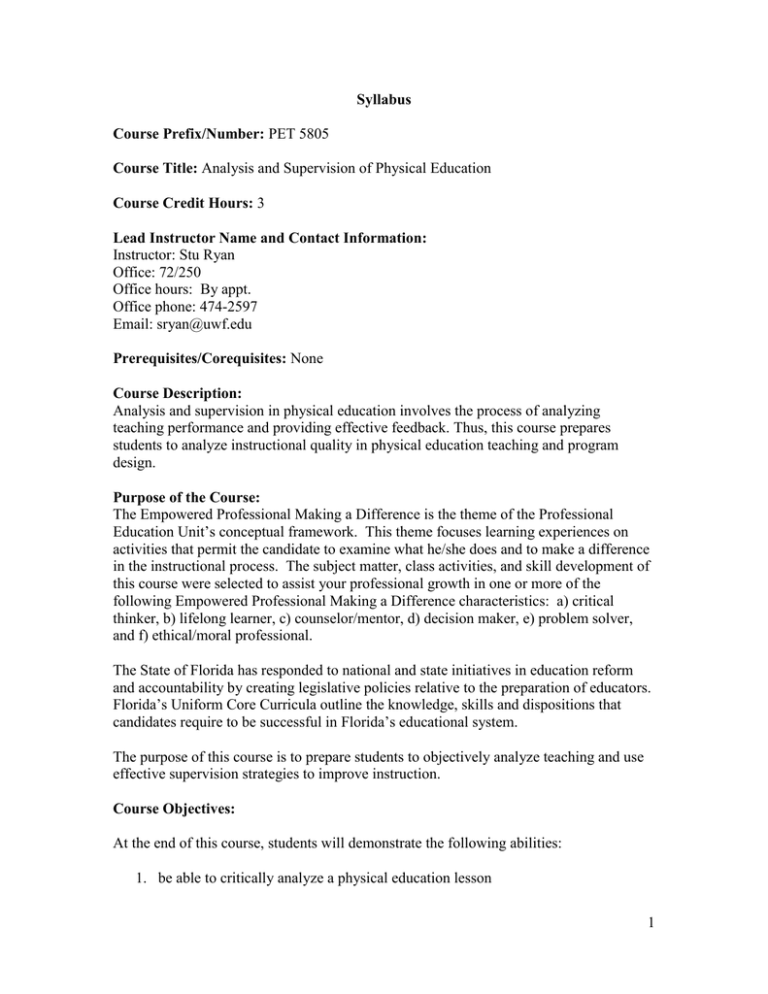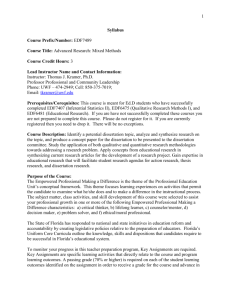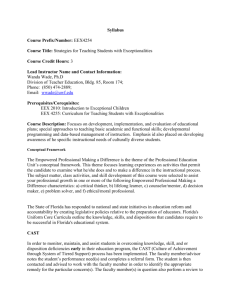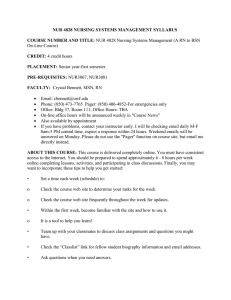PET 5805 - University of West Florida
advertisement

Syllabus Course Prefix/Number: PET 5805 Course Title: Analysis and Supervision of Physical Education Course Credit Hours: 3 Lead Instructor Name and Contact Information: Instructor: Stu Ryan Office: 72/250 Office hours: By appt. Office phone: 474-2597 Email: sryan@uwf.edu Prerequisites/Corequisites: None Course Description: Analysis and supervision in physical education involves the process of analyzing teaching performance and providing effective feedback. Thus, this course prepares students to analyze instructional quality in physical education teaching and program design. Purpose of the Course: The Empowered Professional Making a Difference is the theme of the Professional Education Unit’s conceptual framework. This theme focuses learning experiences on activities that permit the candidate to examine what he/she does and to make a difference in the instructional process. The subject matter, class activities, and skill development of this course were selected to assist your professional growth in one or more of the following Empowered Professional Making a Difference characteristics: a) critical thinker, b) lifelong learner, c) counselor/mentor, d) decision maker, e) problem solver, and f) ethical/moral professional. The State of Florida has responded to national and state initiatives in education reform and accountability by creating legislative policies relative to the preparation of educators. Florida’s Uniform Core Curricula outline the knowledge, skills and dispositions that candidates require to be successful in Florida’s educational system. The purpose of this course is to prepare students to objectively analyze teaching and use effective supervision strategies to improve instruction. Course Objectives: At the end of this course, students will demonstrate the following abilities: 1. be able to critically analyze a physical education lesson 1 2. use objective procedures for analyzing teaching performance 3. provide corrective and positive feedback to teachers to improve instructional performance 4. facilitate successful teaching practices within the lesson related to beginning and ending class, task presentation, providing feedback, closure, and behavioral management Physical Education Student Learning Outcomes: 1.2 Content: Apply a variety of concepts from disciplinary knowledge (pedagogy; motor development and learning; exercise science, sociology and psychology of movement; history and philosophy) when planning and implementing instruction. 4.1 Integrity/Values: Collaborate with members of the learning community to advocate and promote sound educational philosophies and practices aligned with national and state standards, and local program goals. 4.2 Integrity/Values: Demonstrate consistent commitment to learning and reflection that informs practice. 4.3 Integrity/Values: Model professionalism and leadership aimed at securing physical education as a central subject matter in all students’ school experiences. Florida Educator Accomplished Practices: http://www.fldoe.org/dpe/publications/professional4-99.pdf PHYSICAL EDUCATION ADVANCED STANDARDS http://www.aahperd.org/naspe/grants/accreditation/upload/Advanced-2008-PETEStandards.pdf Standard 1: Professional Knowledge Advanced physical education teacher candidates come to understand disciplinary content knowledge, the application of content knowledge to teaching physical education, and modes of inquiry that form the bases for physical education programs and instruction. Standard 3: Professional Leadership Advanced physical education teacher candidates are continuous, collaborative learners who further their own professional development and use their abilities to contribute to the profession. Course Alignments by Assessments, Outcomes, and Standards: Key Course Assignments Conceptual Framework Characteristics Program SLOs Anecdotal Analysis Critical Thinker 1.2 FEAPs 4 Advanced Standards for Physical Education 1 2 Objective Analysis Critical Thinker 1.2 4 1 Intervention Plan Critical Thinker 4.1 4.2 4.3 6 8 3 Course Expectations: By the end of the semester, students will complete the following assignments in order. I. Anecdotally analyze a teaching/coaching performance: Assignment one involves an anecdotal analysis of teaching or coaching performance. With this task, the student will observe (either live or on videotape) and anecdotally analyze the teaching performance. The student is to take notes while observing the lesson or coaching performance and then to write an evaluative report. The evaluative report should be written using guidelines presented in the American Psychological Association 5th edition writing guidebook. The report is likely to be between 5 and 10 pages including title page. II. Objectively observe a teaching/coaching performance After students have completed an extensive anecdotal analysis, they will complete a second analysis in the same setting as assignment #1 using objective (e.g., systematic observation) techniques. You may use a lesson you observed in PET 5701. III. Develop a teacher/coach intervention plan Based on the above assignments, students will develop a 3-5 page teacher/coach “intervention plan” that will aid the teacher/coach in improving his or her teaching performance based on best known practices. Text: There are no required texts for this course. Students will be expected to use resources found on the World Wide Web and from the library to support their work. Course Schedule and Format: This is a “self-paced” course. That is, all work is due at the end of the semester, but may be turned in early if the student desires. All work, however, must be completed by the last day of classes. 3 Grading and Evaluation: Anecdotal Analysis: Objective Analysis: Intervention Plan: 25% 35% 40% Except in situations deemed anomalous, these will be the only grades assigned. All work must be completed during the course and at specified times. In such a case that another grade may be perceived appropriate, prior arrangements must be made with the instructor. If this is not possible, the instructor must be contacted immediately regarding such requests. Grading Scale: Points earned: 95-100 90-94 86-89 81-85 78-80 75-77 71-74 68-70 65-67 61-64 58-60 57 & below A AB+ B BC+ C CD+ D DF Special Technology Utilized by Students: None Expectations for Academic Conduct/Plagiarism Policy: Academic Conduct Policy: (Web Format) | (PDF Format) | (RTF Format) Plagiarism Policy: (Word Format) | (PDF Format) | (RTF Format) Student Handbook: (PDF Format) Assistance: The Student Disability Resource Center SDRC at the University of West Florida supports an inclusive learning environment for all students. If there are aspects of the instruction or design of this course that hinder your full participation, such as time limited exams, inaccessible web content, or the use of non-captioned videos and podcasts, please notify the instructor or the SDRC as soon as possible. You may contact the SDRC office by e-mail at sdrc@uwf.edu or by phone at (850) 474-2387. Appropriate academic accommodations will be determined based on the documented needs of the individual. 4 UWF TurnItIn notice: UWF maintains a university license agreement for an online text matching service called TurnItIn. At my discretion I will use the TurnItIn service to determine the originality of student papers. If I submit your paper to TurnItIn, it will be stored in a TurnItIn database for as long as the service remains in existence. If you object to this storage of your paper: 1. You must let me know no later than two weeks after the start of this class. 2. I will utilize other services and techniques to evaluate your work for evidence of appropriate authorship practices. Syllabus Notice of Change: Although this syllabus is intended for multiple audiences and incorporates the minimum course criteria, the content of this syllabus may change based on individual instructor’s specifications. Any modifications to this syllabus will be announced during the first week of the semester. 5






